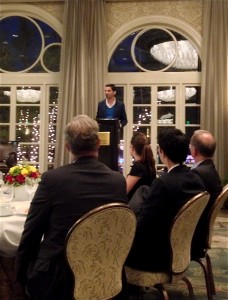 “The state of public radio is uncertain. It’s terrifying and will change what we are doing. But not to scare, because there are a lot of solutions!” This started out the remarks by Guy Raz, host of NPR’s TED Radio Hour. He was this year’s speaker at the James L. Loper Lecture in Public Service Broadcasting presented by the University of Southern California’s Annenberg School of Communications & Journalism. Being both a graduate of the Annenberg School and a voracious consumer of quality news, I found his talk to be refreshingly pragmatic as well as visionary. He spent much time talking about the disrupters to news and how it is disseminated. From how the Guttenberg printing press challenged the gatekeepers of news of the day, to how technology is challenging the gatekeepers of information today. And not only news content, but how the economics of news is either changing, or will have to change. An example is how Craigslist virtually eliminated the classified ads in papers, what had been a strong source of revenue.
“The state of public radio is uncertain. It’s terrifying and will change what we are doing. But not to scare, because there are a lot of solutions!” This started out the remarks by Guy Raz, host of NPR’s TED Radio Hour. He was this year’s speaker at the James L. Loper Lecture in Public Service Broadcasting presented by the University of Southern California’s Annenberg School of Communications & Journalism. Being both a graduate of the Annenberg School and a voracious consumer of quality news, I found his talk to be refreshingly pragmatic as well as visionary. He spent much time talking about the disrupters to news and how it is disseminated. From how the Guttenberg printing press challenged the gatekeepers of news of the day, to how technology is challenging the gatekeepers of information today. And not only news content, but how the economics of news is either changing, or will have to change. An example is how Craigslist virtually eliminated the classified ads in papers, what had been a strong source of revenue.
Up until now, public radio has been fairly immune to the changes. But when Apple put podcasts on iTunes, it meant content is available on the listeners terms, not when it is aired. For public broadcasting, that means the revenue from the periodic pledge drives will most likely decrease as people are “listing” in different ways… “radio” is just one form of “audio.” “Growth will happen in the audio space, but not over the air.”
The opportunities for news are tremendous. Over one billion people have seen a TED video and they have been watched from some of the remotest parts of the globe. That is one in seven people on the planet. And while traditional news had honed the sound bite, “the art of storytelling is experiencing a renaissance.” “We want to take you on a journey that will change your view of the world. People are hungry for stories. People will make time for stories that are worth their while.” One comment that so resonated with me is that “we need to help our audiences distinguish the news from noise!” There is so much fluff and commentary, the important, and factual, news is often lost. “The big problem today is how do we commoditize
news?” We have seen the decline and disappearance of newspapers, this has resulted in less reporters covering stories. There are fewer news bureaus around the world. “It is just too expensive. We need to get out of our comfort zone as to continuing paying for quality news, we need to look at some type of sponsorships… while maintaining our independence. Pushing boundaries doesn’t have to mean compromising our integrity. The change is going to be how we are delivering the content.”
http://www.npr.org/2013/12/13/248190652/spoken-and-unspoken http://annenberg.usc.edu/
